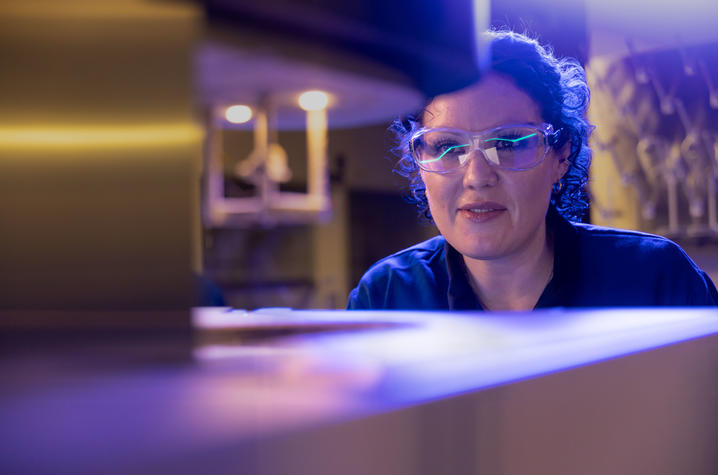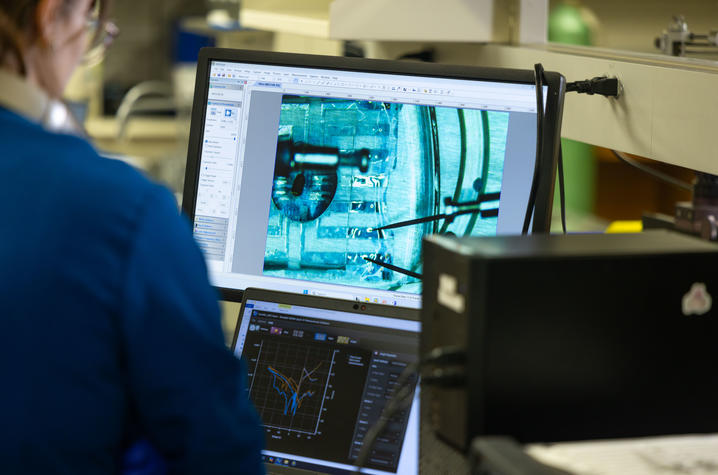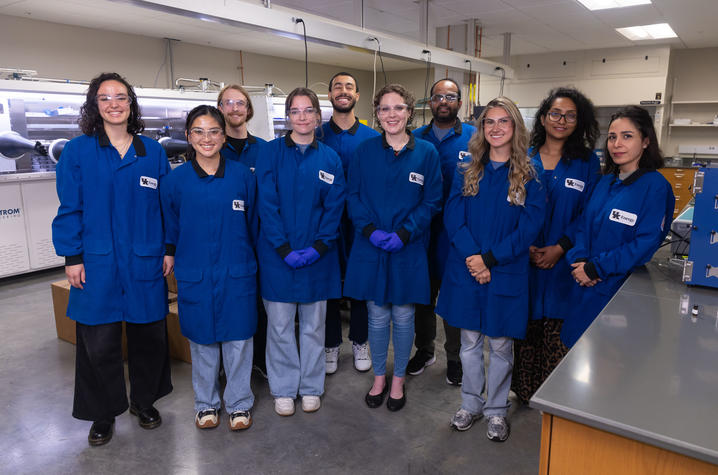UK’s Paterson earns 2 prestigious national awards for research, innovation
LEXINGTON, Ky. (Aug. 15, 2025) — Alexandra F. Paterson’s research paves the way for more reliable and innovative technologies that could benefit health care, manufacturing and everyday life.
For her work, she has earned two prestigious national awards for early-career faculty: the U.S. National Science Foundation (NSF) Faculty Early Career Development (CAREER) Award and the Defense Advanced Research Projects Agency (DARPA) Young Faculty Award.
“I am delighted to receive both awards,” said Paterson, a Lighthouse Beacon Foundation Scholar and assistant professor of materials engineering with a joint appointment in electrical engineering in the University of Kentucky Stanley and Karen Pigman College of Engineering. “These awards will enable my team and I to continue pushing the boundaries of plastic electronics research, while creating new opportunities for students and the broader community.”
Paterson’s research focuses on developing new, flexible electronic devices made from organic (carbon-based) materials, rather than traditional rigid materials like silicon, in the Organic Materials and Devices Laboratory. It’s based in the UK Center for Applied Energy Research.
Paterson’s approach could make future devices — such as wearable health sensors, smart agricultural tools and advanced low-energy computing systems — more adaptable and accessible.
“I am always excited to work alongside my colleagues to develop new, innovative technologies that can make a real difference in people’s lives,” Paterson said. “This work is encouraged by the continued support of the University of Kentucky and Center for Applied Energy Research.”
Improving the building blocks of next-generation medical technology
With support from the five-year $450,000 NSF CAREER Award, Paterson will address a major challenge in organic electrochemical transistors (OECTs). These devices can turn signals from the body into electronic signals, making them useful for medical sensors, drug delivery systems and even smart prosthetics.
Currently, scientists don’t fully understand how the interface between the electrical contacts, and the rest of the device, affects overall electronic performance. This interface determines the speed, efficiency and reliability of OECTs, but it’s often overlooked, and difficult to measure.
Paterson’s team also discovered that OECT performance can be overexaggerated by existing measurements, impacting the entire field. Those findings were published in the prestigious journal Nature Materials. Her NSF CAREER Award work aims to develop better ways to understand the mechanisms causing these anomalies, by studying crucial connections within the device.
As part of the NSF CAREER Award, Paterson will also create new educational initiatives at UK, including outreach activities designed to engage students from a variety of backgrounds in STEM fields.
Creating innovative sensors to protect marine life, advance ocean technology
Paterson’s research, supported by a two-year $500,000 DARPA Young Faculty Award, is developing a new kind of sensor to convert noise pollution into electricity using advanced organic materials.
Noise pollution changes the behaviors of animals that use sound to navigate, communicate, breed and feed. Beyond protecting marine life with potential sensor arrays on ship hulls, this technology could improve ocean mapping, support search and rescue operations, enable underwater communication networks and benefit industries like shipping and offshore construction.
“These dual honors are a testament to Dr. Paterson’s exceptional talent, creativity and dedication. We are proud to see the transformative potential of her work highlighted on such a large scale,” said Rudolph Buchheit, Ph.D., Rebecca Burchett Liebert Dean of the College of Engineering. “Her work exemplifies our mission to advance knowledge and serve society through research, education and outreach.”
“As a rising star in materials science, Dr. Paterson is setting new standards for innovation and impact in our field. Her pioneering research in organic electronics and advanced sensors is not only expanding the boundaries of what materials can do but also addressing real-world challenges,” said John Balk, Ph.D., director of the Materials Science Research Priority Area and the William T. Bryan Professor of Materials Engineering in the Pigman College of Engineering.
“I am thrilled for Dr. Paterson to receive such deserved recognition,” said Rodney Andrews, director of the UK Center for Applied Energy Research. “The Paterson laboratory and her research collaborators are engaged in projects that hold great promise in improving devices we use every day — from health care devices to products that will be more energy efficient and effective. That commitment to improving Kentucky lives and communities is at the heart of what we do every day here at the UK Center for Applied Energy Research.”
Research reported in this publication was supported by the U.S. National Science Foundation under Award No. 2441261. The opinions, findings, and conclusions or recommendations expressed are those of the author(s) and do not necessarily reflect the views of the U.S. National Science Foundation.
This material is based upon work supported by the Defense Advanced Research Projects Agency (DARPA) under agreement number D24AP00298. Any opinions, findings, and conclusions or recommendations expressed in this material are those of the author(s) and do not necessarily reflect the views of the Defense Advanced Research Projects Agency (DARPA).
As the state’s flagship, land-grant institution, the University of Kentucky exists to advance the Commonwealth. We do that by preparing the next generation of leaders — placing students at the heart of everything we do — and transforming the lives of Kentuckians through education, research and creative work, service and health care. We pride ourselves on being a catalyst for breakthroughs and a force for healing, a place where ingenuity unfolds. It's all made possible by our people — visionaries, disruptors and pioneers — who make up 200 academic programs, a $476.5 million research and development enterprise and a world-class medical center, all on one campus.







